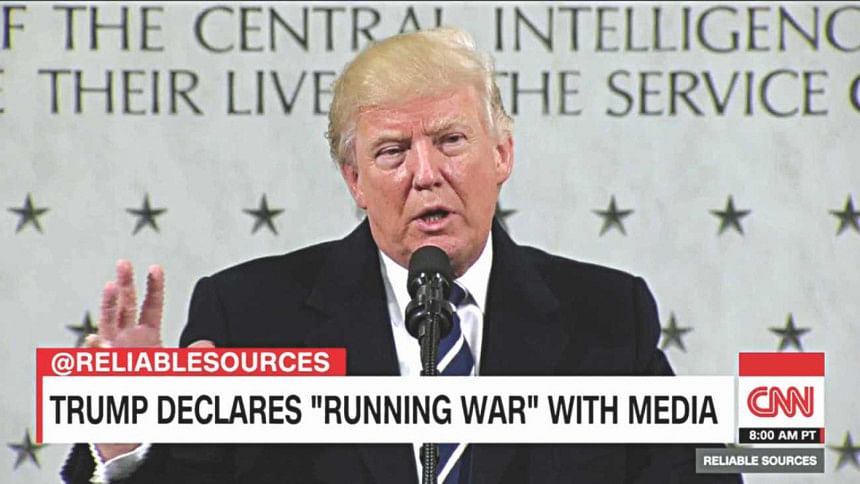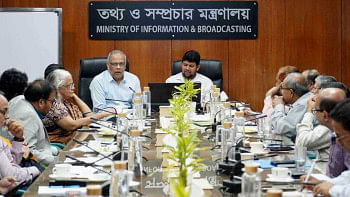Trump's feud with the media

"Our most tragic error may have been our inability to establish a rapport and a confidence with the press and television with the communication media. I don't think the press has understood me."
-- Lyndon B Johnson
"I think the destructive, vicious tone of much of the news media makes it harder to govern this country, harder to attract decent people to run for public office."
-- Newt Gingrich
The ill-will between President Trump and the mainstream liberal media (I will mostly use the term "media" from here on) is well-documented. Presidential sartorial choices are rarely commented upon but a recent television news story dealt with the way he wore his ties long in defiance of the convention that ties should be worn so that they just cover the belt. The suggested reasons for this choice included just flouting fashion orthodoxy to the more plausible one of diverting attention from his paunch. The content of the report was unexceptional but its mocking tone was fairly obvious. The sentiments are mutual. Trump's contempt for the media is well-known, his break with tradition in refusing to attend the White House Correspondents' Dinner being just one of many examples.
It is true that Trump does not take kindly to criticism. He has refused to play by the rules and provide the information that the media feels is his obligation to disclose as an elected public official. His technique in dealing with awkward questions from journalists is rightly deemed to be less than subtle (the term used by some journalists is "Neanderthal"). This is in stark contrast with presidents such as John F Kennedy or Ronald Reagan, for example, who parried hostile questions with wit and charm. Of course, all this feuding with the media may simply be part of a carefully designed media "spin" strategy of distracting attention from weightier questions such as his relationship with Russia, his taxes and business interests. It has been an effective strategy – exaggerating minor issues (and non-issues) in the expectation that the sensation-seeking media will latch on to the irrelevant and devote less resources to serious problems.
The old conventional wisdom was that no one could ever hope to win in an argument with the media. The media would always have the last word. This was perhaps true until the internet and social media revolution of the last two decades. Now there are vast new networks providing alternative sources of information. Individuals can now filter the news and facts that reach them to a degree that has eroded the power of the media to influence public views and perceptions. President Trump uses these new channels of information effectively, ensuring his messages directly reach his supporters and without interpretation or distortion, by-passing the "liberal media".
The traditional media has not fully grasped its reduced role and relevance to many people. As a result, it has failed to develop an appropriate response to the changes in technology and seismic shifts in the political order. There is more to it however. In recent decades, the media has gradually shifted to being an objective reporter of news events to becoming an interpreter and even influencer of events. Most news channels now indiscriminately promote a "cult of personality" among newscasters (as a form of branding perhaps), but not every media person's views on events are of interest to the public nor can every newsperson become a Christiane Amanpour. The contrast to the circumspect style of the more widely respected older generation of newscasters in the US in the 1950s and 1960s such as Walter Cronkite, Chet Huntley and David Brinkley, is striking.
It is difficult to be perfectly neutral of course, and there are situations where human nature and sensibilities preclude clinical objectivity. However, one recalls the "embedding" of Western journalists with Allied (American) forces in the Second Iraq War. What standard of objectivity could be expected from such news teams, given the unavoidable fellow-feeling that must result from such embedding? In retrospect, the war was certainly not a clear-cut case of good versus evil. The direct and indirect results of the war have left many Iraqis longing for the Saddam Hussein era.
The Trump White House will never get over its visceral dislike and distrust of the media, whatever happens for the remainder of this administration. The media will continue to despise and demonise Donald Trump. The possibility of a rapprochement is negligible. This is a problem only to the extent that media access to information is adversely impacted, unlikely given the multiple avenues of access to information now available. An adulatory relationship would be more worrying at a time when the presidency (and indeed the Grand Old Party) has been commandeered by a political outsider who has signalled his intention to break the established rules and precedents.
What the liberal media needs to do now is bring back greater objectivity in news reporting to improve their acceptability and credibility (as well as ratings), and to focus on uncovering the facts. It is difficult to fill the entire airtime of a channel with news stories but cutting back on the presentation of unwanted opinions may be warranted. Moreover, it is not enough to make truthful statements if by the suppression of inconvenient facts there is an intentional misrepresentation of a situation. The media for its part needs to critically review its entire ethos and modus operandi.
The Trump presidency has already provided more opportunities for investigative journalism than the previous half-century of American politics. Journalists of the calibre and courage of Woodward and Bernstein of Watergate fame may be uncommon, but they do exist. The concern is that where the administration takes a threatening tone, will the owners of the liberal media risk retribution by backing such journalism? Will they be willing to take the bold stand publisher Katharine Graham of the Washington Post took in 1972?
The real tragedy would be if the American media now resiles in fear from its role as a watchdog against abuse of authority and a counterweight to the power of the executive branch of the government. This is critical at a time when the presidency, Senate and House of Representatives (as well as about two-thirds of state governorships and state legislatures) are in the hands of one party. It is true that the Republican Party is not a monolithic entity. However, it appears that the rank and file of the party has accepted Trump's leadership while the grandees of the GOP are too bewildered and demoralised to oppose him after his demolition of most of the established leaders of the party during the nomination process.
The judiciary certainly remains capable of mounting some sort of defence against at least some of the administration policies that conflict with basic American liberties and values, but at the level of the Supreme Court, the situation is less clear. The Trump presidency and the current lopsidedness of political power makes one wonder if the system of "checks and balances" designed by the Founding Fathers of the United States is finally being overwhelmed.
The writer is IMF Macro Fiscal Advisor to the Ministry of Economy and Finance, Cambodia.

 For all latest news, follow The Daily Star's Google News channel.
For all latest news, follow The Daily Star's Google News channel. 



Comments